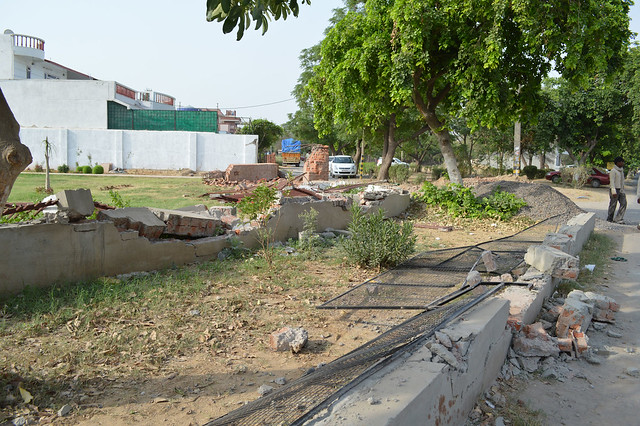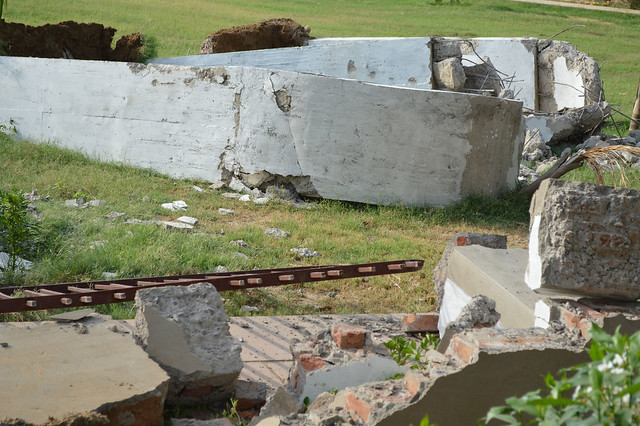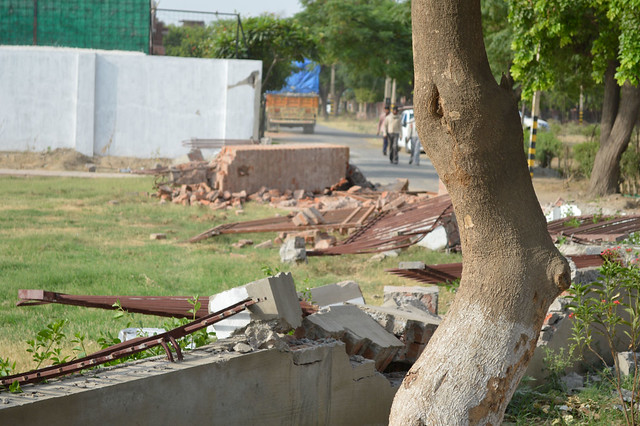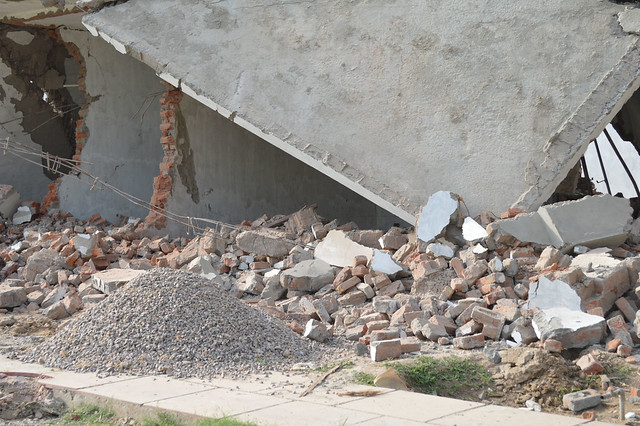A poor auto-wala succumbs to police brutality away from media glare.
By Mohd. Ismail Khan, TwoCircles.net,
Hyderabad: Khaki brutality in our nation is not a new dilemma, every day we come across gruesome cases of extreme police cruelty on people whom law provided their custody. It is often reported when it falls in radius of media in cities and major towns, but there are many victims like Shiekh Javed in rural lands where their story is being buried deep away from any media glare.
Arrested for ‘obstructing legal duty’
On April 20, earlier this year, after day long work with his rented Auto rickshaw, Shiekh Javed was having a ‘light moment’ with his friend Jagan at midnight near Vidyanagar water tank. He was a resident of village located in the outskirts of Sricilla town in Karimnagar district, but use to spend much of his time in passenger carrying service in the town.
![]()
Javed's faimly members
Two police officers on bike, one constable and other home guard approached the duo and got into a verbal spat. Very soon the constable called the Sircilla Police Station circle inspector who took Javed into custody and booked him under Section 353 of IPC (obstructing government servant from discharging duties).
The family of Javed claimed that constable was asking ‘Mamool’ (weekly bribe) as Javed have earlier given the same, but this time he got agitated and was caught into a verbal spat, the officers booked him in false case to make a lesson out of him. While police maintain that Javed was intoxicated and abused the officers on night duty.
For next two days, 25 year old Javed have to stay in jail, and only on the evening of 23 April he got bail and returned to his small kacha house where he was living with his ailing mother. His family claims that when he returned back he had serious head injury, which according to Javed, was inflicted upon him by the CI with revolver grip.
Javed succumbs to head injuries
For two long days he complained about serious pain in his head, on 25 April he got seizures and was quickly rushed to a government hospital in Sricilla town, where doctors refused to admit him as he was already unconsciousness. In order to save his life humble family has to take him to Karimnagar city at CAR hospital, where doctors informed the family that injury over his head has caused cerebral hemorrhage in brain tissue, which urgently need to be operated.
His extended family put up money together and aided his operation in that private hospital, his operation was successful, but he had to stay for more 25 days in the clinical care. His family had to take him out from the hospital on May 20th as the bills were becoming unbearable.
Javed, even after his family’s best efforts, couldn’t get complete treatment due to their economic conditions, but he was recovering on medicines in his home and even started communicating through hand signals. However suddenly something unexpected struck them again, Javed again got seizures on 31st May and was rushed to the same hospital, on 1st June at 8:0 pm in ICU, where he breathed his last.
Doctors told his family that hemorrhage in brain tissue was caused as the head injury wasn’t completely treated when Javed was shifted out of hospital due to financial problems, and that hemorrhage caused more bleeds in his brain tissue, leading to seizures and his subsequent death.
His Uncle claims Javed was beaten up in police custody
Deceased Sheikh Javed’s uncle Ghulam Samdani, speaking with TwoCircles.net, told that there is no doubt in his mind that police is responsible for his nephew’s death. He said, “When I met Javed on second day of his arrest in the court room, he was crying and trying to show the injury on his head which was covered with balm to stop the bleeding. When I asked him did police beat him in the jail, he started crying and didn’t give any answer, as two officers were escorting him. But his crying eyes already gave me my answer. When he got back on bail I asked him again to conform his cry, and again with numb eyes he told me that the Inspector had beaten him up with police revolver accusing him of insulting police.”
Mr. Samdani who work as attendant in district court said they didn’t inform the hospital in which he was admitted that it was a police torture case fearing that hospital will ask them to complete formalities. Thus no postmortem was done on his body, and now his mother and one elder brother who lives separately is afraid of fighting against police.
Javed’s uncle also added that Javed did not have any previous seizures and that only after getting injury on head he started developing epilepsy and subsequent hemorrhage.
Ghulam Samdani further told TCN that it is nothing but a case of a poor worker who refused to pay his weekly bribe ‘Hafta’ to collector cop, which led to his inhuman beating, incarceration and subsequent painful death.
click to see Sheikh Javed dead body
Andhra Pradesh Civil Liberties Committee, in its fact finding report, stated that local police has threatened the family members of Javed from filing any complaint against police officers who arrested them. Citing reports of Javed’s medical treatment, APCLC claimed that hemorrhage in his brain tissue developed before he got admitted to the hospital which was caused by a powerful hit on his skull, which clearly indicates, he was beaten up in police custody.
APCLC also claimed that harassment of workers in Sircilla town who failed to give Mamools to police is becoming rampant.
Death from torture medically impossible: Police
Local police Circle Inspector Nagendar Chari who arrested Javed on the night of April 20 and allegedly beat him up denied all charges. Speaking with TCN, he refuted all the allegations leveled against him and his department by family and human rights groups.
He reiterated that Javed was drunk and obstructed night patrolling officer’s legal duty. CI Nagendar Chari even claimed that Javed used to quarrel a lot with police even in Jail but neither he nor his station staffs ever tried to beat him. Inspector also refuted the claim that his cops got into verbal spat with Javed over collection of ‘Hafta’, he said, “This is a small rural town, it’s not Mumbai, people leveling this allegations against us, and want to scare us in executing our duties.”
He denied that family is leveling allegation against him of torture by stating that Javed’s family till date didn’t file any complain with the police. Inspector also claimed that local civil rights groups are instigating family to malign him.
Inspector Chari went on to say that even medically Javed’s death is not possible by police torture. He said, “Javed died 1 ½ month after getting out on bail, medical reports claim that he died of cerebral hemorrhage, he was in police custody for nearly three days, if he was beaten to an extent of getting hemorrhage he would have died within 40-60 hours without any treatment.” Police claimed that Javed was fine and healthy in their custody, it was only after he got out on bail he suffered from seizures and hemorrhage.
On the allegation of threats to the family against filing any complain, inspector giggled and then said, “We are officers not rowdy elements; I didn’t even speak to any of their family members.”
On questioning even after this kind of serious allegation of death due to torture, why didn’t police conduct post-mortem? Inspector said they couldn’t do it as family didn’t file any written complaint of torture.
Another state base Human rights group Civil Liberties Monitoring Committee (CLMC) commenting on the case said Sheikh Javed’s death is highly suspicious as police inspector does not seem in a position to give rational answer on his death. CLMC said that police stations are increasingly becoming dangerous place especially for Muslims. Committee demanded that this case should be deal with the provisions of communal violence bill.
another photo of Sheikh Javed's dead body
‘Police manages to diminish wall for justice’
Even as civil rights groups are holding cannons against police as APCLC demanding CID inquiry into the death, and CLMC stating that it is planning to approach State minorities commission and Human Rights commission, family of Sheikh Javed and local Muslims who on the day of his death even threatened of going on hunger strike with dead body in front of Superintendent Police camp office is now literally numb; they are not even ready to say a word against police.
Local sources told TCN that police who was increasingly getting in the line of fire managed the poor family by giving them Rs. 4, 50,000 as informal compensation, by keeping one local MIM leader as intermediary. The police thus saved its face and bolted the mouth of the victim’s family and local Muslims.
In this all managing play of our police, at the end of the day Sheikh Javed who is buried deep in some rural hamlet and whole society emerges as the biggest loser, as the saying goes ‘justice denied anywhere diminishes justice everywhere’. Justice is the true parameter to portray the image of our society and the nation, of who we are and what we stand for.





















